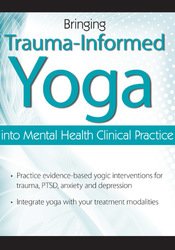

Watch this state-of-the-art workshop and discover yoga-based interventions to regulate the autonomic nervous system and learn exactly how to incorporate these interventions into your psychotherapy session.
Watch Debra Premashakti Alvis, Ph.D., RYT, in an in-depth training on the principles and practices of trauma-informed yoga, with a special focus on chair yoga postures, yogic breathing exercises, and yoga nidra, the yogic sleep. She is one of the first practitioners to combine yoga with the wisdom of neuroscience and techniques from somatic psychology into a personalized approach for bringing yoga into the session, groups, and yoga classes. The focus of this work is on regulating the client’s autonomic nervous system as the groundwork for trauma healing.
Debra trained with Dr. Bessel van der Kolk’s The Trauma Center in Boston and will share transformational skills for you and your clients. Learn first-hand why organizations as diverse as the U.S. Army and the U.S prison system have embraced yoga as an evidence based approach to treat post-traumatic stress disorder, anxiety and depression.
Through lecture, experiential exercises, video clips, and case studies, you will leave with the background and tools you need to add trauma-informed yogic interventions to whatever style of therapy you currently practice
Discover how trauma-informed yoga can improve your clinical outcomes!
| File type | File name | Number of pages | |
|---|---|---|---|
| Manual (4.78 MB) | 55 Pages | Available after Purchase | |
| Manual - French (4.78 MB) | 55 Pages | Available after Purchase | |
| Manual Part 2: Neuroscience, Trauma and Yoga - French (4.78 MB) | 55 Pages | Available after Purchase | |
| Manual - Italian (4.78 MB) | 55 Pages | Available after Purchase | |
| Manual Part 2: Neuroscience, Trauma and Yoga - Italian (4.78 MB) | 55 Pages | Available after Purchase |

Debra Premashakti Alvis, PhD, is a licensed psychologist and private practitioner with over 30 years of clinical experience in supporting clients’ recovery from trauma, mood and relational concerns. Debra began working with parts of the self over three decades ago training extensively in Jungian oriented psychotherapy and contemplative approaches. She applied movement, mindfulness, and the expressive arts to explore parts of the self. She deepened her understanding of inner parts through multiple Internal Family Systems therapy educational trainings, combining her embodied contemplative approach with the IFS model. She finds that this integrative approach strengthens the self through facilitating the resolution of inner conflicts.
A seasoned international presenter and consultant, Dr. Alvis is a therapeutic yoga educator and mindfulness meditation teacher. She retired as faculty member from the University of Georgia where she developed and led the mind/body program. The program included a clinician training program integrating mindfulness, yoga and psychotherapy. A personal contemplative practice, research experience, and a deep understanding of Polyvagal Theory further enrich her presentations. She draws upon this unique background to provide effective, easily applicable skills designed for immediate integration into clinicians’ practices.
In addition to teaching, Dr. Alvis maintains a private practice and has more than 25 years of clinical experience in treating clients with a variety of conditions by mindfulness principles, body-oriented principles and traditional psychotherapeutic approaches. She also has an over 30-year personal contemplative practice.
Speaker Disclosures:
Financial: Debra Alvis maintains a private practice and receives a speaking honorarium from PSIvet, Ridgeview Institute, Twin Lakes Recovery Center, eCare, Essential Therapy Training, Alma, CEU Creations and Mountain Area Health Education Center. She is a paid consultant for Evergreen Certifications. Debra Alvis receives a speaking honorarium and recording royalties from PESI, Inc. She has no relevant financial relationships with ineligible organizations.
Non-financial: Debra Alvis is a member of the American Association of College Student Personnel, the Association for Contemplative Mind in Higher Education, the Association of Specialists in Group Work, the Athens Area Psychological Association, and the Georgia Psychological Association.
Please wait ...